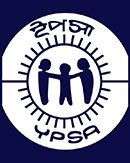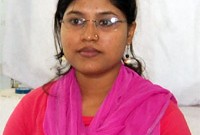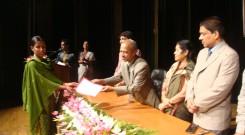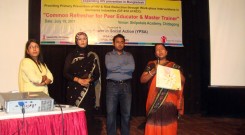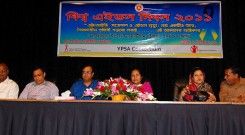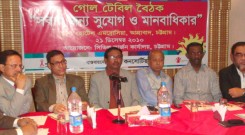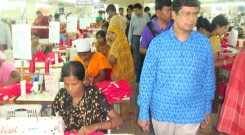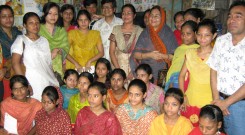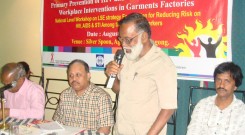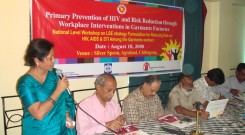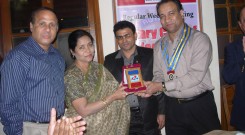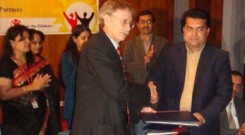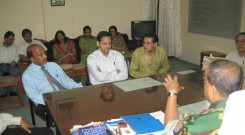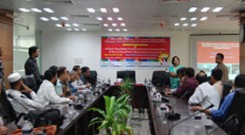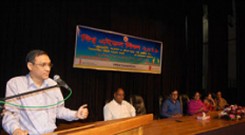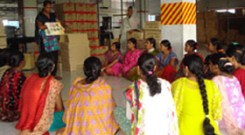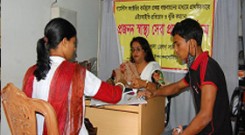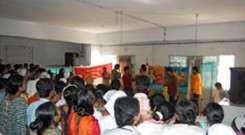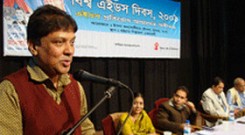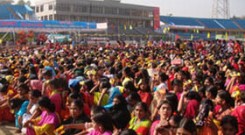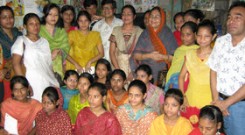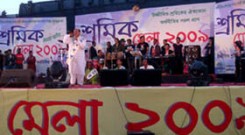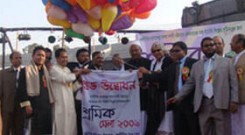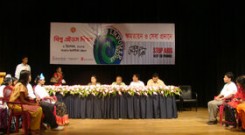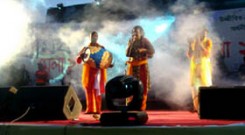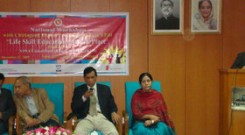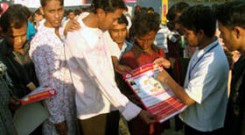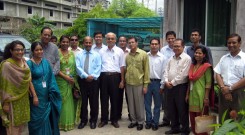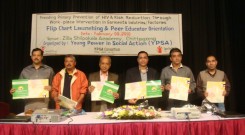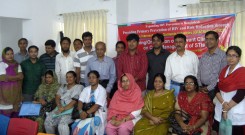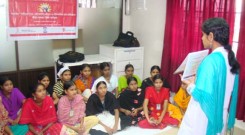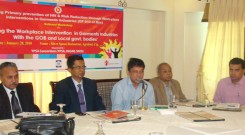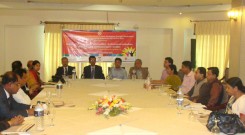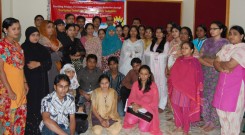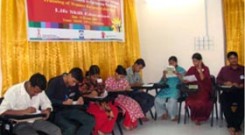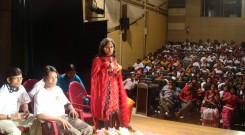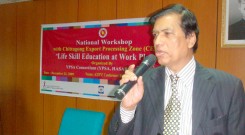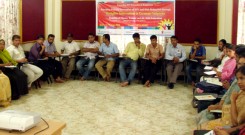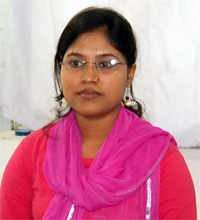Photo Gallery
Project Report
Monitoring and Evaluation Framework
Project Completion Report (2012)
Progress Assessment of workplace intervention at Garment Factory (2012)
Name of the Project:
Providing Primary Prevention of HIV and Risk Reduction through Workplace Interventions in Garments Factories/Industries (GFATM#912) of RCC.
Donor: Global Fund, Principle Recipient: Save the Children-USA
Goal:
To limit the spread and impact of HIV in the country through preventing HIV/AIDS/STIs and reducing risks among the garment workers
General Objective:
- Mainstreaming of life skill education including safer sex in collaboration with BGMEA at workplace and implementation of workplace policy through continues advocacy to ensure support; providing support to ensure services for STI and sexual & reproductive health problem through facilitate effective referral mechanism to nearby health facilities
- To capacitate garment factory workers through conduction of like skill education using peer approach; providing training for the master trainers, peer educator; demonstrate and playing video documentary related to HIV/AIDS to ensure source of information beyond the education session.
Duration: February 2008-March 2012
Location & Target Coverage:
| Area Coverage |
Beneficiary/TG coverage |
||||||
| Name of District | Name of Upazila/Thana | No. of union/Ward | No. of Village/Mahalla/Para | Categories | Direct | Indirect | Total |
| Chittagong | Bayazid Bostami, Khulshi, Panchlaish, Bakalia, Kotowali, Double Mooring, Patenga, Bandar, Halishahar, Pahartali, Chadgaon |
41 Wards | All of Chittagong city | Male | 146,367 | 292,733 | 439100 |
| Female | 585,466 | 1,170,933 | 1,756,399 | ||||
| Child | |||||||
| Total | 731,833 | 1,463,666 | 2,195,499 | ||||
Background:
To fight against HIV/AIDS, tuberculosis and malaria, the GOVT. of Bangladesh has received grants from GFATM along with Save the Children-USA as the principal recipient. The title of the HIV/AIDS component of RCC is “Expanding HIV Prevention in Bangladesh”. There are 13 package of RCC (Rolling Continuation Channel) under this title. YPSA Consortium has been implementing the package of GF-912, which title is “Providing Primary Prevention of HIV and Risk Reduction through Workplace Interventions in Garments Industries”.
The GF-912 project focuses on prevention of HIV through workplace intervention in the garment factory and in the community. The activities include-national workshop for advocacy, endorsement & implementation of a workplace policy, sensitization meeting with BGMEA & other stakeholders, LSE at workplace, peer education, video show, distribution of BCC materials, development of audio song on HIV & AIDS issue, interactive theatre show, management of STI and other SRH cases etc. The activities are being implemented both at workplace, and at residential setting of young garment workers and their neighbors
Major Activities of RCC:
- Organize National level workshop with national garment export institution and owners
- Organize sensitize meeting with BGMEA, Garment owners, Workers’ representativeness and health service providers
- Day Observation (WAD, IWD, May day, etc)
- Joint event with BGMEA (Workers fair & others)
- Arrange regular coordination meetings with associate partners as per approved coordination framework [Quarterly Consortium Committee-CC Meeting
- Bi-monthly PMU-Partners meeting
- Monthly/ Bi-monthly coordination meeting between AO and SP/ PMU team meeting
- Annual review meeting
- Regional Coordination meeting
- Printing of LSE Implementation strategy
- Develop and produce one page take home communication material
- Finalize and printing of flip chart including guideline
- Booklet for garment workers as communication material
- Training of master trainers on life skill education for the prevention of HIV
- Training/orientation of relevant clinicians on case management, recording and reporting of STIs with BGMEA support
- Training of peer educator on life skill education for the prevention of HIV
- Common refreshers for Peer Educators including Master Trainers
- Master Trainer Assembly
- Conduction of 4-day LSE sessions on HIV prevention in the workplace
- Mapping of health care facilities for STI, SRH management and general health of garment factory workers within and local to the factories through rapid situation assessment with BGMEA support in Chittagong.
- Management of STI and other SRH cases
- Video presentation and discussion at the home of garment workers for the prevention of HIV
- Develop one audio documentary on HIV and STI prevention to increase knowledge retention among the Garment Factory Workers considering local language and culture
- Interactive Theatre on HIV and STI
Major Accomplishment:
| Activities |
Achievement |
Cumulative Achievement from the beginn2008) |
| Needs Assessment on Garments Workers |
0 |
1 no. |
| Conduction of 4 day LSE sessions on HIV prevention in the garment setting | 123,985 workers | 324,369 workers |
| Video presentation and discussion at the home of the garment workers for the prevention of HIV | 243,613 workers & Community people | 682,502 workers & Community people |
| Organize National level workshop with national garment export institution & owner | 36 participants | 1,030 participants |
| Organize sensitize meeting with BGMEA, Garment owners, Workers’ representativeness and health service providers | 0 | 11 meetings with 105 participants |
| Day observation: World AIDS Day, International Women’s day, May day | 208 participants | 546 participants |
| Joint event with BGMEA( Workers fair):1 | 1 Joint events | 03 Joint events |
| Annual review meeting | 45 Participants | 60 Participants |
| Regional Coordination meeting | 57 Participants | 97 Participants |
| Develop & Produce one page take home material | Printed & distributed 110,000 take home materials | Printed & distributed 915,000 take home materials |
| Finalize and printing of flip chart including guideline | — | Developed & distributed 1500 flip chart among Master Trainers & Peer educators. |
| Booklet for garment workers as communication material | 125,000 Booklet printed and distributed | 250,000 Booklet printed and distributed |
| Training of peer educator on life skill education for the prevention of HIV | 60 peer Educators trained | Trained 845 peer educators on life skill education. |
| Training of Master trainers on life skill education for the prevention of HIV | 0 | Trained 160 master trainers, on life skill education. |
| Common refreshers for peer educators including Master Trainers | 151 peer educators, Master Trainer attended | 529 peer educators, Master Trainer attended |
| Training/orientation of relevant staff on case management, recording and reporting of STIs with BGMEA support (3 days) | 38 Participants | 38 Participants |
| Mapping of health care facilities for STI SRH management and general health of garment factory workers within and local to the factories through rapid situation assessment with BGMEA support in Chittagong. | 0 | 1 Mapping |
| Management of STI and other SRH cases | Provided services to 12,550 patients | Provided services to 12,550 patients |
| Develop one audio documentary on HIV and STI prevention to increase knowledge retention among the Garment Factory Workers considering local language and culture | 0 | 1 Audio documentary |
| Interactive Theatre on HIV and STI | 106 shows | 127 shows |
Consortium Partner:
Young power in Social Action (YPSA)
HIV/AIDS and STD Alliance Bangladesh (HASAB)
Samaj Kalyan Unnayan Sangstha (SKUS)
Strategic Partners (SPs):
Nirmol Foundation, NOWZUWAN, NONGOR, JUGANTAR SAMAJ UNNAYAN SANGSTHA, AWAC, Step To Alleviate Poverty (STAP), SAJAN SOCIAL SERVICE SOCIETY, Mamata, Nishriti, Ghashful, Image, Badhan, ANNESHA, UNITE Theatre For Social Action (UTSA), DRISTY
Yasmin Akther: Benefited by Health Service and Making Benefit of Many
[event_news taged=”gfatm912″]
